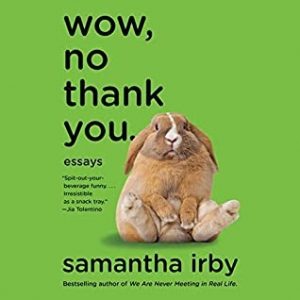I listened to this collection of essays on audio, in which Samantha Irby herself reads, which is how I highly recommend you consume this book. Irby brings her biting wit and raw honesty to each essay, making them feel more like confessions. But they create a lifeline to so many who feel the way she does, making readers feel more connected and less alone. And she does it all with great humor, never taking herself, or anything, too seriously.
She covers various topics, from critiquing personas and performances on social media in “Into the Gross” to how over she is of the criticism of people being addicted to their phones in “Hung-Up!” Irby has no problem calling out others who act like they’re better than the rest of the world. She understands that at the end of the day, everyone is a mess pretending to have their ish together.
“Girls Gone Mild” is by far the most relatable and funniest essay in the collection, in my opinion. She gives a hysterical rundown of a typical girls’ night out for women 30+ who can no longer handle spontaneous outings and drinking too much. Her elaborate, minute-by-minute detail of how she plans her nights out now that she’s older sounded all too familiar and had me laughing so hard I cried.
In “Late 1900s Time Capsule,” she breaks down a typical mixtape from her youth track by track, annotating how each song captivated her teen angst, pretentious thoughts and intense emotions. As she talks about including the Indigo Girls on her mixtape she declares, “What do you mean you’re surprised I ended up with a lady?” proving there is a way to joke about queerness without being offensive. She even talks about those bygone days when you really had to be sure you wanted to invest in buying a whole album, because you couldn’t just purchase a single track.
Irby doesn’t shy away from topics often considered taboo, especially for women. She freely discusses sexuality alongside romance and relationships. She even tackles the horrors of getting your period in “Hysterical!” While hilarious in its unabashed humor, it’s also a critique on how any talk that does happen around the menstrual cycle centers on white women’s bodies and experiences, thus neglecting BIPOC bodies.
In essays like “Body Negativity” and “Hollywood Summer,” she tackles issues with body image and lack of representation of fat people. Or rather, the dismal representation of fat people. Although she takes on the topic with her signature humor, it’s clear it’s a subject that cuts to the core, and anyone who’s ever lived as a fat person in this world can relate.
Overall, this essay collection will make you laugh, but also make you think. It’s smart, witty, sarcastic, and filled with tales of horror about living as an anxious individual. You can’t help but laugh alongside Irby’s commentary on everything from making a living as a writer to moving to the country from the big city.


